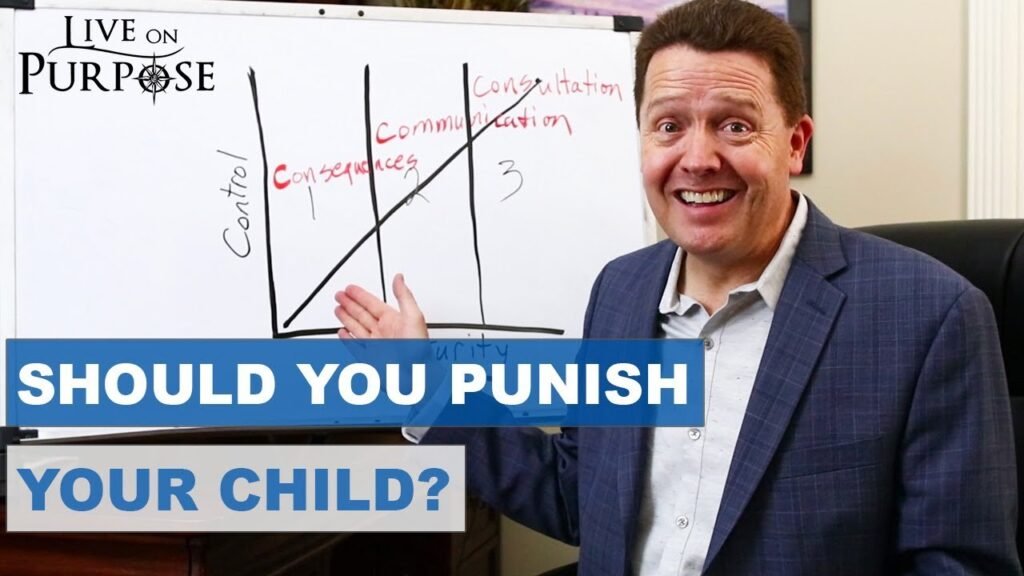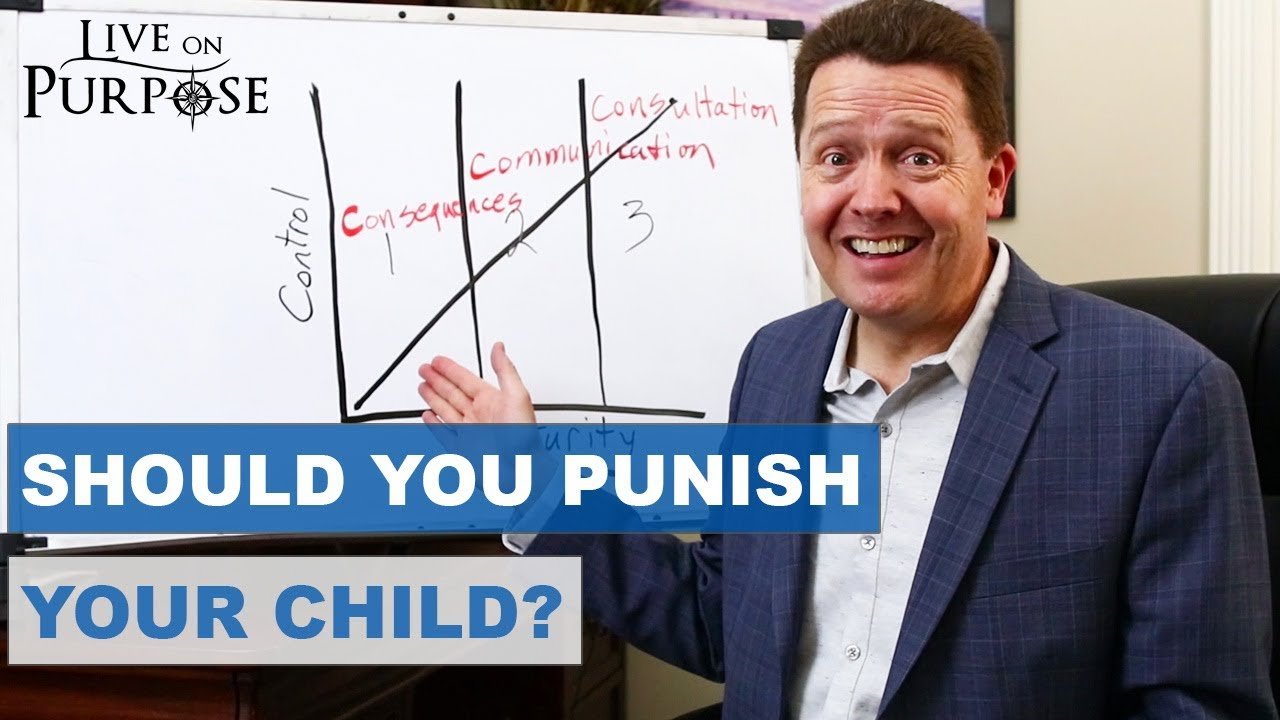In the article “Consequences: A Key Element in Positive Parenting,” you’ll learn about the importance of consequences and how they play a crucial role in effective parenting. The article outlines the relationship between control and maturity, emphasizing that parental control increases as children grow more mature. It discusses the three stages of moral development and how consequences are effective in each stage, from controlling what parents provide in stage 1 to using communication and assigned essays in stage 2. The article highlights how consequences empower parents, reduce frustration, and put them in a position of power. It also recommends the “Parenting Power-Up” as a valuable resource for solid parenting tools.
In a video by Live On Purpose TV, Dr. Paul Jenkins explores the significance of consequences in positive parenting. He explains the relationship between control and maturity and how these factors intersect. Dr. Paul breaks down the model into three stages, highlighting the use of consequences in each stage. He emphasizes the importance of consequences in stage 1, where children are often selfish and manipulative, and expands on the use of communication and consultation in stage 2 and 3 respectively. The video provides valuable insights and examples, demonstrating the effectiveness of consequences in positive parenting.
Introduction
Parenting is a complex journey filled with challenges and uncertainties. As parents, we constantly strive to guide and support our children as they navigate through various stages of development. One important aspect of positive parenting is the use of consequences. In this article, we will explore the significance of consequences in positive parenting and how they can contribute to the control and maturity of our children.
The Importance of Consequences in Positive Parenting
Consequences as a Key Element
Consequences serve as a key element in positive parenting. They provide our children with valuable lessons about responsibility, accountability, and the cause-and-effect relationships in their actions. By establishing clear consequences for their behaviors, we are helping them understand the impact of their choices and encouraging them to make wise decisions.
Control and Maturity in Parenting
Control and maturity are closely related in the realm of parenting. As parents, we gradually increase our control over our own lives as we become more mature. Similarly, our children’s control over their lives increases as they grow and develop. Understanding this relationship allows us to effectively utilize consequences to guide our children towards greater maturity.
Parental Control and Children’s Maturity
As our children progress through different stages of moral development, their level of maturity increases. In the early stages, such as stage 1, characterized by selfishness and manipulation, children have limited control over their own lives. However, as they move towards stage 2, marked by willingness to cooperate, and stage 3, where they seek wise advice, their maturity expands, and they gain more control. By implementing appropriate consequences at each stage, we can empower their growth and development.
Stages of Moral Development in Children
Stage 1: Selfishness and Manipulation
Stage 1 of moral development is characterized by selfishness and manipulation. Children at this stage are primarily concerned with their own desires and are less likely to consider the needs of others. As parents, it is crucial to establish clear consequences that help them understand the impact of their actions and guide them towards more selfless behaviors.
Stage 2: Willingness to Cooperate
In stage 2, children start to exhibit a willingness to cooperate. They begin to understand the importance of working together and maintaining harmony within their family and social relationships. By reinforcing this cooperative mindset through appropriate consequences, we can help them further develop their ability to consider the perspectives and needs of others.
Stage 3: Seeking Wise Advice
Stage 3 represents a significant milestone in moral development, as children exhibit a drive to seek wise advice. They start to recognize the value of guidance from authority figures, such as parents, and actively seek their input when faced with challenging situations. In this stage, our role as parents shifts towards consultation, allowing our children to make informed decisions while providing them with the necessary support and guidance.

Effectiveness of Consequences in Different Stages
Consequences in Stage 1
During stage 1, when children are primarily focused on their own desires and manipulation, consequences play a crucial role in shaping their behavior. By implementing consequences that directly relate to what parents provide, such as limiting access to privileges or electronics, we can establish boundaries and teach them the importance of taking responsibility for their actions.
Consequences in Stage 2
In stage 2, where children are more willing to cooperate, consequences can focus on fostering communication and understanding. Engaging in conversations with our children, discussing family rules, and allowing them to propose their own consequences for their actions can be effective in reinforcing the importance of cooperation and accountability.
Consultation in Stage 3
As children progress to stage 3, consultation becomes a primary approach for guiding their behavior. Instead of relying solely on consequences, parents can engage in open and respectful discussions, offering wise advice when requested. This approach empowers children to make their own choices while providing them with the guidance they need to navigate complex situations.
Focus on Controllable Factors and Effective Use of Consequences
Directing Attention to What Parents Can Control
In positive parenting, it is essential to focus on what we, as parents, can control. By redirecting our attention to factors within our control, such as what we provide and the boundaries we set, we can effectively utilize consequences and guide our children towards responsible decision-making.
Using Consequences Effectively
Effective use of consequences involves establishing clear and consistent expectations, ensuring that the consequence is proportionate to the behavior, and providing opportunities for learning and growth. It is crucial to approach consequences with a positive and constructive mindset, emphasizing the lessons to be learned rather than solely focusing on punishment.
Examples of Consequences in Different Stages
Stage 1: Controlling What Parents Provide
In stage 1, controlling what parents provide can be an effective consequence. For example, limiting access to electronics or specific privileges can help children understand the consequences of their behaviors and encourage them to make more responsible choices.
Stage 2: Conversations and Assigned Essays
In stage 2, consequences can involve engaging in conversations and assigned essays. By discussing family rules and the impact of their actions, children can gain a deeper understanding of the consequences of their behavior. Assigning essays that require reflection and critical thinking can further enhance their learning experience.
Empowerment and Reduction of Frustration through Consequences
Placing Parents in a Position of Power
The use of consequences puts parents in a position of power, allowing them to guide their children’s behavior positively. By focusing on what they can control and implementing appropriate consequences, parents can foster a nurturing environment that promotes growth and maturity.
Reduction of Parental Frustration
Consistently implementing consequences can also reduce parental frustration. By establishing clear expectations and consequences, parents can avoid power struggles and effectively communicate their expectations to their children. This helps create a harmonious family dynamic and minimizes frustration for both parents and children.
The Parenting Power-Up: A Recommended Resource
Introduction to the Parenting Power-Up
One valuable resource for parents seeking effective tools for positive parenting is the Parenting Power-Up. This program provides comprehensive guidance on utilizing consequences, communication, and consultation at various stages of moral development. It offers strategies and techniques to empower parents and strengthen their relationship with their children.
Benefits of Using the Parenting Power-Up
By utilizing the Parenting Power-Up, parents gain access to a wealth of knowledge and practical tools. This resource helps parents navigate the complexities of parenting, promotes effective communication, and equips them with the skills needed to establish clear expectations and consequences.
How to Access and Utilize the Parenting Power-Up
To access and utilize the Parenting Power-Up, parents can visit the program’s website and enroll in the available courses or workshops. The program provides step-by-step guidance on implementing consequences effectively, enhancing communication with children, and fostering a positive and nurturing environment for the entire family.
Conclusion
Consequences play a crucial role in positive parenting, shaping the behavior and development of our children. By understanding the connection between control and maturity, as well as the different stages of moral development, we can effectively utilize consequences to guide our children towards responsible decision-making. By focusing on controllable factors and utilizing resources such as the Parenting Power-Up, we can enhance our parenting skills, reduce frustration, and foster an environment that promotes growth, maturity, and harmonious family relationships.

